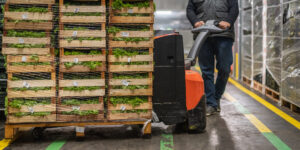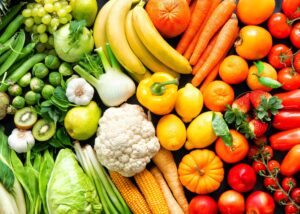July 22, 2024
In this post: Evaluating Sustainability Practices in Food Service | The Case For Prioritizing Sustainable Food Waste Management | The Scale of Food Waste from Food Service | The Cost of Food Waste to Food Service Businesses | Meeting Consumer Expectations with More Sustainable Food Waste Management | Organic Waste Compliance for Food Service | Sustainable Food Waste Management Practices | Your Partner in Sustainable Food Waste Management
Summary: Food service businesses have five key areas of sustainability to address: energy, water use, packaging, ingredients, and food waste. This post explores the potential environmental and business impacts of prioritizing sustainable food waste management.
As a food service owner or manager operating with slim margins—both in resources and time—it can be difficult to know how to prioritize sustainable practices, and even more complex to try and implement them on your own. From packaging and utensils to energy use and food waste, the options seem endless, but not all of them are feasible with your current business needs and goals, and some have more impact on your carbon footprint than others. In this post, we’ll explore sustainability practices for food service businesses (restaurants, catering, cafeterias, and buffets) and how to strategize the practices that will have the greatest impact.
Evaluating Feasibility & Impact of Sustainability Practices
There are five key areas of a food business’s carbon footprint that are important to address: energy, water use, packaging, ingredients, and food waste.
Many sustainability solutions can require long-term planning to protect slim margins, such as making the switch to energy- and water-efficient appliances. Eco-friendly packaging, a solution most consumers might think of when it comes to sustainability in food service, can cost up to 25% more than traditional plastic packaging, according to Food Dive, and can still be a source of contamination and pollution. Other solutions such as sustainable food waste management can provide a more immediate and significant reduction to a food business’s carbon footprint, with lower impact to revenue margins.
The Case For Prioritizing Sustainable Food Waste Management in Food Service
Food waste from food service businesses, in the form of food scraps, plate waste, and unsold food, is a significant contributor to landfill waste and a restaurant’s total carbon footprint.
Globally, the U.N. reports that a fifth of all food is wasted, while nearly 800 million people go hungry. Organic landfill waste is responsible for 15% of U.S. methane emissions and 10% of overall global greenhouse gas (GHG) emissions. A potent greenhouse gas, methane has about 80 times the warming power of carbon dioxide over the first 20 years; immediate steps to reduce food waste can have long-term impacts on preventing further damage from methane and other greenhouse gasses.
The Scale of Food Waste from Food Service
ReFED, a national nonprofit dedicated to ending food loss, has conducted extensive research to understand the role that food service plays in contributing to the volume of wasted food within the U.S.:
- Consumer-facing businesses contribute 20% of the total food waste that ends up in landfills each year.
- Of that 20%, full service and limited service restaurants contribute 48%, or nearly 9 tons annually.
- In 2022, restaurants and food service businesses generated 13 million tons of surplus food, more than 85% of which went to landfills or was incinerated as waste.
- More than 45% of the total surplus was generated by full-service restaurants, and nearly 70% of the total surplus came from plate waste, or customers not eating what they were served.
The Cost of Food Waste to Food Service Businesses
Another recent study found that restaurants waste 4% to 10% of the food they bought, and the restaurant industry generates approximately 33 pounds of food waste per $1,000 of a restaurant’s revenue. These statistics don’t take into account the fact that food waste is a cost that businesses pay twice: first in purchasing and handling that food, and then in paying to dispose of it.
Key among the contributing factors driving food waste volumes in the food service industry is a lack of data. As ReFED explains it,
“Many restaurant and foodservice companies struggle with identifying first steps in food waste reduction because they lack quantifiable information about where and why waste is occurring. Currently, some use manual data collection methods, but technology-enabled tracking improves accuracy and efficiency of data collection, leading to better insights and quicker turnaround. Surplus tracking and analytics help to pinpoint large areas of opportunity, such as identifying the volumes and types of food that are disposed of during preparation. This information informs and optimizes operations, increasing profits, eliminating waste, and forming the business case for investment in other food waste solutions.”
According to ReFED’s research, waste tracking efforts could unlock a $3 billion economic opportunity for the food service industry annually, with potential to reduce up to 1.05 million tons of wasted food, reduce up to 5.76 million metric tons of CO2 emissions (CO2e), save up to 478 billion gallons of water, and ultimately create more than 1,500 jobs industry-wide.
Meeting Consumer Expectations with More Sustainable Food Waste Management
Much like eco-friendly packaging and serviceware, sustainable waste management practices can go a long way in fostering loyalty with consumers, as demonstrated in this 2022 survey from restaurant software company Deliverect:
- 51% said seeing large amounts of food waste frustrates them and impacts their decision to order from that restaurant again
- 73% of respondents want more accurate portion sizes to avoid food waste
- 68% said takeaway restaurants should have practices in place to avoid unnecessary food waste
Sustainable food waste management isn’t just better for the environment; it makes good business sense.
Organic Waste Compliance for Food Service
Consideration needs to be given not only to the scale of the food waste problem and its costs to a business, but also to the emerging legislation and regulations at local, state, and federal levels. States like California and Washington have enacted new legislation for organic waste management that employ a mix of incentives and penalties to recover donatable food and divert non-donatable food away from landfills.
To comply with emerging legislation and meet sustainability goals, food service businesses need to look for food waste management solutions that can provide visibility into the amount and type of food being wasted, as well as diversion methods that are sustainable on a commercial scale, such as anaerobic digestion.
Sustainable Food Waste Management Practices in Food Service
There are several steps that restaurants, caterers, and other food service businesses can take to reduce food waste, from adjusting portions to right-sizing production, to changing the way unsold and uneaten food is managed with sustainable diversion methods.
Not all waste diversion methods are created equal, though. While composting organic waste can be a beneficial approach for some small business restaurants, it’s not feasible for all, and there can be significant challenges to scaling compost efforts commercially, such as managing moisture levels and preventing contamination from food packaging. For these reasons, anaerobic digestion (AD) is becoming a preferred alternative for managing food waste on a commercial scale.
AD is a process through which bacteria break down organic matter in the absence of oxygen. Anaerobic digestion can produce environmentally beneficial byproducts in the form of biogas that can be used as renewable energy to reduce demand for fossil fuels, and it can also produce beneficial digestate as an agricultural input such as fertilizer.
In 2023, the Environmental Protection Agency (EPA) updated its Food Recovery Hierarchy with a new model: the Wasted Food Scale. The scale assesses and ranks different wasted food management practices based on environmental impact and circularity. An analysis by Divert reveals that anaerobic digestion is the strongest performing pathway after Prevention and Feeding Others, making it an ideal diversion tactic for food service businesses.
Your Partner in Sustainable Food Waste Management: Divert
Ultimately, addressing food waste in your business can have multiple co-benefits for your business and your community, from reducing your environmental impact immediately and locally, to complying with emerging regulations around food waste management, and fostering greater loyalty with consumers who support responsible business practices, to protecting profitability by reducing waste costs.
Divert is your partner in cost-effective, simple and sustainable food waste management. With 17 years of experience in wasted food diversion for commercial businesses, Divert’s deep experience in the organic waste disposal space gives us the knowledge, size and scale to drive sustainable change for the food service industry.
Divert’s data-enabled waste diversion platform not only keeps valuable food out of the landfill, it creates insights that Protect the Value of Food™ upstream.
- Prevent – We invent transformative technologies and create actionable data to help our customers understand and prevent waste.
- Provide – We take a people-first approach to food recovery by providing our customers with data-driven solutions and support to optimize their food donations to communities in need.
- Power – Our proprietary anaerobic digestion process removes greenhouse gasses from the food value chain by converting wasted food into renewable energy.
Our approach is designed to support food service businesses with:
- Integration into existing operations
- Simple & clean diversion options via pickup service
- Depackaging systems
- Monthly reporting and ESG tracking
- First-class customer support
With Divert, you’ll not only be able to keep your food scraps, plate waste, and unsold food out of local landfills, but you’ll be able to measure your impact right away. Contact us today to learn more about our program.



